
The information you need to make your sustainability ambitions a reality
In this edition
- Extreme weather events cause US$65 billion in losses in H1 2022
- Leading institutional investors engage on global water crisis
- McKinsey releases report on packaging sustainability
- CBoC reports on accelerating chemical recycling in Canada
- SASB eases issuers into the new reporting regime
- Deal Announcements
U.S. Inflation Reduction Act – What is it and what does it mean for Canada?
On August 16th, the U.S. Inflation Reduction Act (IRA) was signed into law. As a reminder, the IRA provides US$737 billion over 10 years, of which US$369 billion is earmarked for spending in energy security and climate change.
The Act represents the country’s largest single investment to combat climate change and puts the U.S. on a path to reducing its carbon emissions by 40% by 2030. This would be achieved through speeding up the production of solar panels, wind turbines, batteries and critical-minerals processing, promoting climate-friendly agricultural practices, and providing tax credits to retrofit homes and purchase electric vehicles (EVs).
What does the Act mean for Canada? In our opinion, the U.S. is now fully engaged in the net zero transition and it is now up to Canada to deliver on climate policies, or risk losing talent and capital to the U.S. One opportunity for Canada lies in the Act’s EV tax credit, which extends the incentives to EVs built throughout North America.
Extreme weather events cause US$65 billion in losses in the first half of 2022
Munich Re reported that extreme weather events driven by climate change resulted in US$65 billion in total losses globally in the first half of 2022. Of this value, US$34 billion are uninsured assets. In addition, the global number of fatalities from natural disasters reached 4,300 in 2022, which is regrettably more than previous years.
The United States dominates this loss figure, accounting for the highest weather-related losses at US$28 billion, of which US$19 billion were uninsured. These extreme weather events are often quick and devastating. For example, in early April 2022, a single thunderstorm front produced tornadoes destroying assets worth more than US$3 billion across the Southeastern United States. Munich Re opines that this thunderstorm is a perfect example of how high insurance density can help absorb the economic shocks of natural disasters.
Looking to the remainder of the year, the Intergovernmental Panel on Climate Change (IPCC) believes that weather-related disasters driven by climate change, such as extreme heat, drought and wildfires, will increase in both frequency and intensity, as we have recently witnessed in Europe. As such, Munich Re is calling for insurers to adapt their loss models to adequately assess the ongoing, changing risk.
Leading institutional investors join forces to engage on global water crisis
On August 16, Ceres, a sustainability nonprofit organization, launched the Valuing Water Finance Initiative to engage 72 corporate water users and polluters to value and act on water as a financial risk, and drive the necessary large-scale change to better protect water systems. This initiative, launched with 64 global institutional investors, such as Fidelity International, Franklin Templeton and Manulife Investment Management, represents US$9.8 trillion in assets under management.
The 72 focus companies with a high water footprint include Nestlé, Unilever, Hershey, General Mills, Kellogg Company, McDonalds, Lululemon, Levi, Apple and Microsoft. Signatory investors to the initiative will engage companies on six science-based Corporate Expectations for Valuing Water, which includes water quantity, water quality, ecosystem protection, access to water sanitation, board oversight, and public policy engagement. The initiative will use public disclosures such as the Carbon Disclosure Project or GRI (Global Reporting Initiative) to monitor company progress against these expectations.
This initiative is the first global investor-led initiative aimed at engaging companies in response to the global water crisis. This is critical as severe drought, pollution, and inadequate access to safe drinking water have both societal and potential financial impacts.
And the sustainability leaders are…
The GlobeScan and the SustainAbility Institute by ERM published their Sustainability Leadership Survey, which questioned more than 700 sustainability professionals across 73 countries on sustainability leadership and the shifting sustainability agenda.
Findings from the survey revealed that sustainability experts unanimously declared the urgency of climate change with growing focus on energy security. Social issues have decreased in perceived urgency.
Sustainability leadership has also evolved and is increasingly measured by evidence of action, impact and the integration of sustainability into business strategy. For example, high-profile CEO engagement and strong communication around sustainability have declined as an indicator of recognized sustainability leadership. Instead, companies that put sustainability at the core of their business models/strategies and report on the tangible outcomes of their sustainability initiatives are regarded as leaders in the field. As a result, Unilever tops the list of companies recognized as sustainability leaders, followed by Patagonia, Natura & Co, IKEA and Microsoft.
China lags on ESG disclosure
A study by the World Economic Forum concludes that “Chinese companies lag behind their global peers in the scope and quality of their ESG disclosures.” By mid-2020, over 1,000 (or 24%) of Chinese A-share companies had published annual ESG reports, which increased from 371 in 2009. In comparison, Millani’s (a consultancy) Annual Canadian ESG Disclosure Study showed that around 71% or 169 companies listed on the S&P/TSX Composite Index are reporting on their ESG activities. While south of the border, the S&P 500 has about 92% or 460 companies also reporting on ESG.
Generation Investment Management points out in a recent article that to meet the global net zero goals, China must be engaged on the topic.
Chinese government’s climate plan of reaching carbon neutrality by 2060 is significant as it bolsters China’s geopolitical objective to be energy independent, therefore cutting imports of foreign oil and gas, and building domestic production of renewable energy. Today, 30% of Chinese electricity production is zero emission, compared to the US at around 40%. China’s private sector also has a huge role to play. Notably, some companies have taken action; for example, Alibaba has pledged to become net zero by 2030 on their scope 1 and 2 emissions.
Generation Investment Management releases quarterly investor letter
Generation Investment Management, an investment firm co-founded by former US Vice President Al Gore and former Goldman Sachs Asset Management Head, David Blood, issued their quarterly investor letter which is becoming a ‘must read’ in sustainability circles. In the letter, they reflect on the global landscape which is key to their focus on long-term economic and geopolitical trends rather than short-term news. The three themes they explore are China’s place in the world, the strength of the global economy, and the role of businesses in delivering sustainable outcomes. The letter provides useful insights on the evolving sustainability landscape from an investment management lens.
McKinsey believes no single packaging substrate is an absolute leader
McKinsey states that no single packaging substrate, including plastic, glass, metal or paper is an absolute leader in packaging sustainability. In their report, Climate Impact of Plastics, McKinsey examines the total GHG contributions of plastics versus their alternatives across their entire product life cycles and the impact of use within five sectors – packaging, building and construction, consumer goods, automotive and textiles.
Based on U.S. data, in 13 out of 14 applications analyzed, plastics produced less GHG emissions than the next-best non-plastic alternative. Specifically, plastics produced 90% less GHG emissions than steel in hybrid fuel tanks, 80% less than paper grocery bags, and 25% less than copper residential water pipes as shown below.
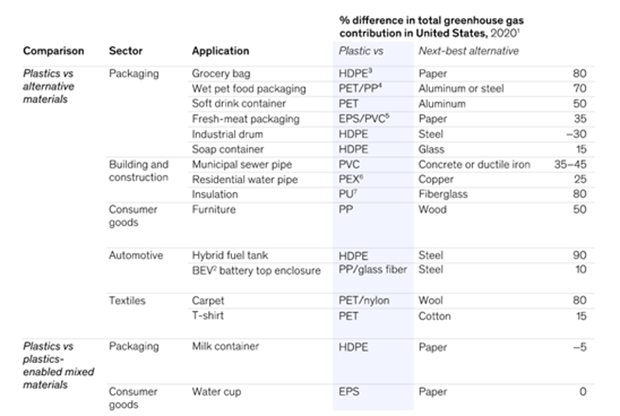
Source: Climate Impact of Plastics
Globally, aluminum cans are competitive with plastic bottles in Western Europe but have a higher total greenhouse gas contribution footprint in China.
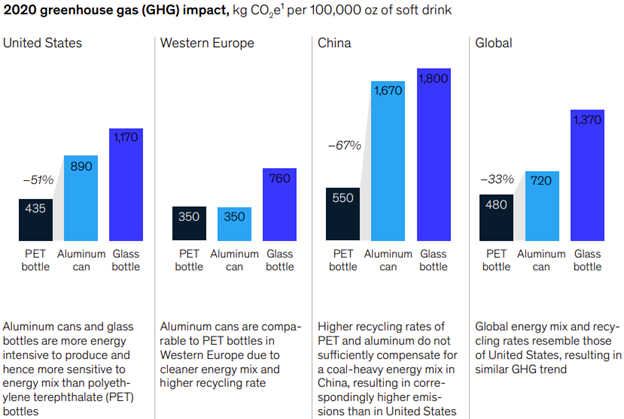
Source: Climate Impact of Plastics
According to McKinsey, plastics are less energy intensive to produce and more weight-efficient.
Opportunity to scale and accelerate chemical recycling in Canada
The Conference Board of Canada (CBoC) published Canada’s Innovation Competitiveness in Chemical Plastics Recycling. Currently, plastic recycling is dominated by mechanical recycling, which has various limitations, including addressing contaminated plastics. This shortfall presents an opportunity for integrating chemical recycling – the breakdown of plastics into a feedstock state – into the plastics value chain. The report states that the potential market for chemical recycling in Canada and the U.S. is ~US$120 billion.
To accelerate and scale this technology, the report analyzes 13 Canadian municipalities and finds a lack of policy and infrastructure consistency, with only 6% of government entities and 19% of private sector firms collecting data on the amount of plastic waste they generate, sort, recycle, incinerate or landfill. As such, the CBoC recommends updating institutional waste management contracts, enabling a science-based evaluation of municipalities landfill liabilities and adjusting recycling programs. Recommendations to financial institutions include engaging firms in adopting circular approaches to plastic waste through ESG disclosures and performance metrics.
Furthermore, the report notes that accelerating chemical recycling is vital, as globally over 400 million tonnes of plastics are consumed yearly, and over 90% are landfilled or incinerated. Given North America’s high dependence on landfills, leadership and action on the plastic waste issue are needed to advance chemical recycling.
How changing behaviors and embracing healthier practices can help achieve net zero by 2050
Achieving net zero emissions by 2050 requires a profound transformation of our global energy system, but, technological solutions on their own are unlikely to be enough to deliver emissions reductions at the speed and scale required.
The International Energy Agency (IEA) states that 63% of energy reduction needed for the world to reach net zero by 2050 can be achieved if people change their behavior and embrace healthier practices for the planet and themselves, as it turns out. This shift in societal norms and personal choices requires a mix of low carbon technologies and individual engagement.
For example, the IEA reports that reduced aviation demand is the single most important change in transportation behavior. By keeping business and long-haul flights at 2019 levels, and shifting local flights to rail, aviation reductions can account for an 80% decrease in the travel-related emissions by 2050.
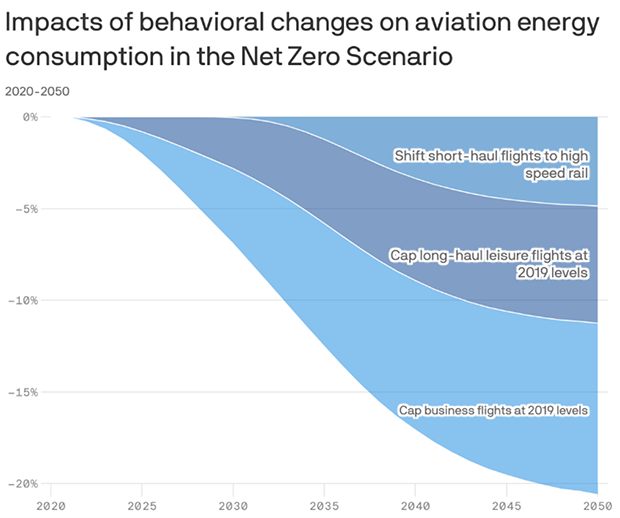
Source: International Energy Agency
How do we achieve this behavioral change? Policymakers need to recognize the barriers to behavioral changes and put in place policies that make it easy for people to modify the way they use energy. This includes raising awareness of climate change by providing accessible and clear information, nudging energy consumers towards environmentally friendly solutions, subsidizing climate conscious lifestyles, and making emissions-intensive activities more costly.
SASB easing issuers into the new reporting regime
In August 2022, the International Sustainability Standards Board (ISSB) of the IFRS Foundation assumed responsibility for the Sustainability Accounting Standards Board (SASB) Standards. The ISSB will leverage and build on the industry-based SASB Standards when developing its mandatory climate-related disclosures coming into force at the end of 2022. In the meantime, the ISSB encourages preparers and investors to continue reporting against SASB Standards.
To assist corporate professionals responsible for the external reporting effort of companies, SASB published an implementation primer, which highlights key considerations for reporting. This includes identifying key audiences for reporting, deciding where to disclose SASB data, understanding which risks are material, assessing readiness for mandatory reporting and establishing formal feedback loops for continuous, iterative reporting.
Sustainability across CIBC
At CIBC, we are focused on our goal to make sustainability a reality for our clients and the communities we serve. Whether through greening their balance sheet or providing sustainability advisory services, our objective is to help our clients become global leaders in environmental stewardship and sustainability.

Deal announcements
In line with our commitment to make sustainability a reality for our clients and the communities we serve, CIBC Capital Markets supported significant client deals and provided sustainability advisory as part of a focused objective to help our clients become global leaders in environmental stewardship and sustainability.
Podcasts
CIBC Capital Markets’ podcast series focusing on the evolving complexities of the sustainability landscape – with a view to addressing current issues in a concise format to help you navigate and take action.
Chart of the day
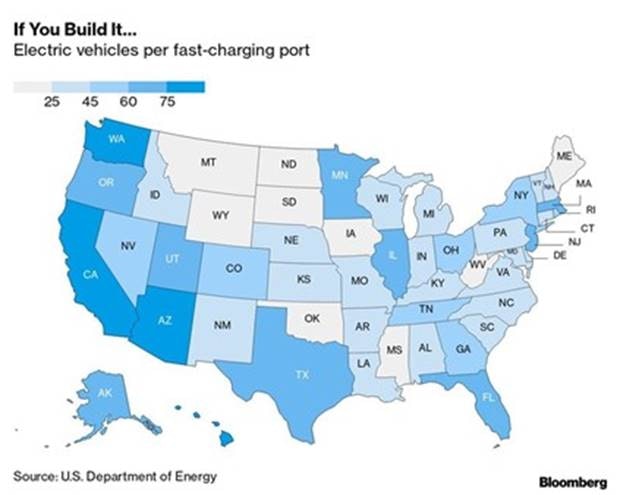
Source: Bloomberg
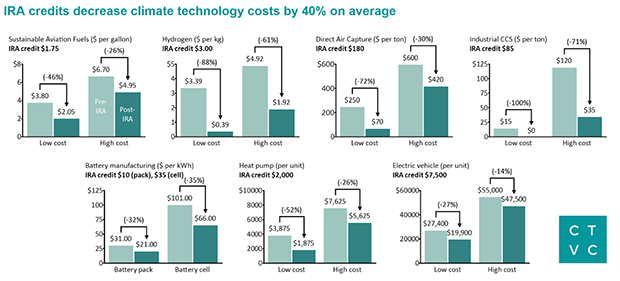
Source: Climate Tech VC
CIBC Capital Markets Insight Portal
Your one-stop destination for thoughtful and timely insights on today’s most critical issues.
Stay informed. Follow CIBC Capital Markets on Twitter and LinkedIn.


















The CIBC logo and “CIBC Capital Markets” are trademarks of CIBC, used under license.


















